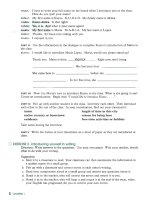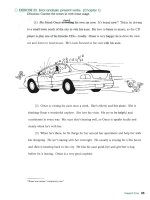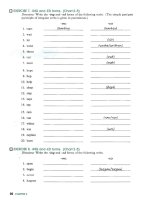Fundamentals of english grammar third edition part 64 doc
Bạn đang xem bản rút gọn của tài liệu. Xem và tải ngay bản đầy đủ của tài liệu tại đây (377.55 KB, 7 trang )
1.
Have a conversation in which one of you invites the other to a party.
2.
One of you is a teenager, and the other is a parent. The teenager is having problems at
school and is seeking advice and encouragement.
3.
The two of you
are
a married couple. One of you is reminding the other about the
things she should or has to do today.
4.
Have a conversation in which one of you persuades the other to begin a health
program by
taking
up
a new kind of exercise (jogging, walking, tennis, etc.).
Beginning of the dialogue:
A:
I
need to get some physical exercise.
B: Why don't you take up
. . .
?
A.
No, I don't want to do that.
5.
One of you is fourteen years old, and the other is the parent. The fourteen-year-old
wants to stay out late tonight. What will the parent say?
6.
One of you is a store detective, and the other is a shoplifter. The store detective has
just seen the shoplifter take something.
7.
One of you is a stubborn, old-fashioned, uneducated person who thinks the world is
flat. The other tries to convince the stubborn one that the world is round.
EXERCISE
37.
Error analysis: noun clauses. (Chapter
14)
Direcrions:
Correct the errors.
1.
My friend knows where&I live.
2.
1
don't know what is your e-mail address?
3.
I
think
so that
Mr.
Lee is out of town.
4.
Can you tell me that where Victor is living now?
5.
1
asked my uncle what kind of movies does he like.
6.
I
think,
that my English has improved a lot.
7.
Is true that people are basically the same everywhere
in
the world.
8.
A
man came to my door last week.
I
don't know who is he.
9.
I
want to know does Pedro have a laptop computer.
10.
They have no children, but their dog understands what do they say.
11.
Sam and
I
talked about his classes. He told that he don't like his algebra class.
Noun
Clauses
49
12. A
woman came into the room and ask me Where is your brother?
13.
I
felt very relieved when the doctor said, you will be fine. It's nothing serious.
14.
I can understand what do
I
read
in
the newspaper, but
if
someone speaks the same
sentences to me, I can't understand what is he saying.
15.
My mother asked me that: "When you will be home,,?
EXERCISE
38.
Noun clauses and questions. (Charts
5-2
and 14-1
-
14-4)
Directions:
Do you agree or disagree with the given quote? What do you think about the
role of technology in children's education? Discuss
in
groups or as a class. Write a
summary of your views.
"Technology brings into the classroom new capabilities and possibilities in a child's
learning environment. However, the most important factor
in
whether an educational
setting is effective for a child is the teacher. The second most critical factor
in
a child's
educational success is the child's home. Technology is far down the List of
things
that
really make a difference, but it can make a difference."
-John Nasom, Direcwr
of
Insauccional Technology
Samtoga School
Dirtrict
430
CHAPTER
14
1
CONTENTS
Al-1
Phrasal verbs: introduction
A1-2
Phrasal verbs: intransitive
A1-3
Three-word phrasal verbs
A1-4
Phrasal verbs: a reference list
EXERCISE
1.
Preview: phrasal verbs. (Appendix
1)
Directions:
Complete the sentences with the given words. The words may be used more
than once.
1.
The children's toys are all over the floor during the day, but before they go to bed,
they always
put
their toys
aUaY
.
2.
In the winter,
I
never
go
outside without a coat. Before
I
go out,
I
always
put
my coat.
3.
I took a book from the shelf and then renuned it to the exact same place.
In
other
words, when I was finished looking at the book,
I
put
it
where
I
found it.
4. Sometimes I postpone doing my homework in the evening and watch
TV
or talk on
the phone instead. I probably should do my homework first, but sometimes
I
put
it
and do it later.
5.
1
am not a late sleeper.
I
get
early almost every day.
6.
1
usually take the bus to work.
I
get
the bus near my apartment and
get
just a block from my office.
7.
We're leaving on May
1.
We'll return May
7.
As soon as we
get
from
our trip on the
7*,
we'll call you.
8.
When I entered the dark room,
I
turned
the lights. When
I
left,
I
turned
them
because it's important to save electricity.
Al-1
PHRASAL
VERBS:
INTRODUCTION
111
(a) we
put
qa
our mp.
wcu
go
next monm msteac
of
this month.
(put
off
=
postpone)
(b)
Jirnmy,put
on
your
coat before you
go
outdoors
(put on
=
phce
clothes
on one's body)
(c) Someone left the scissors on the table. They
didn't belong there.
I
put
them
a
(put
awqy
=
put something in
its
usual
orproperplace)
(d) After
I
used the dictionary,
I
put
it
back
on the
shelf.
(put back
=
return something
w
its origrnal
olacel
I
SEPARABLE
(e) We
put
off
our
tr&.
=
(vb
+
particle
+
NOUN)
(f)
We
put
our
trip ofl
=
(vb
+
NOUN
+
particle)
(g) We
put
it ofl
=
(vb
+
PRONOUN
+
particle)
NONSEPARABLE
GI)
I
mn
into
BOA
=
(vb
+
particle
+
NOUN)
(i)
I
ran
into
him.
=
(vb
+
particle
+
PRONOUN)
m
[a):
out on
=
a Dnrasal verb.
A
phrasal verb
=
a verb and a particle that
together have a special meaning. For example,
put
off
means "postpone."
A
particle
=
a "small word" (e.g.,
off, on, away
back)
that is used
in
a phrasal verb.
Note that the phrasal verbs with
put
in
(a),
@),
(c), and (d) all have different meanings.
Some phrasal verbs are separable: a
NOUN
OBJECT
can either
(1)
follow the particle, as
in
(e),
OR
(2)
come between (separate) the verb and the
particle, as
in
(f).
If
a phrasal verb is separable,
a
PRONOUN
OBJECT
comes between the verb and the particle, as in
(g).
INCORR@CT:
out off it.
If
a phrasal verb is nonseparable, a
NOUN
or
PRONOUN
always follows (never precedes) the
particle, as in
Q
and (il.
CORRECT:
I
in
~obinto.
ISCORRECT:
I
ran him into.
EXERCISE
2.
Phrasal verbs: separable
vs.
nonseparable. (Charts
Al-1
and
A1-4)
Directions:
If
the
phrasal verb is separable, mark
SEPARABLE.
If
it is not separable, mark
NONSEPARABLE.
1.
CORRECT:
I
turned
the light
on.
CORRECT:
I
turned on
the light.
2.
CORRECT:
I
ran into
Mary.
(INCORRECT:
I
run
Mary
into.)
3.
CORRECT:
Joe
looked up
the definition.
CORRECT:
Joe
looked
the definition
up.
4.
CORRECT:
I
got off
the bus.
(INCORRECT:
I
got
the bus
08)
5.
CORRECT:
I
took off
my coat.
CORRECT:
I
took
my coat
08
6.
CORRECT:
I
got in
the car and left.
(INCORRECT:
I
got
the car
in
and left.)
SEPARABLE
turn on
=
0
NONSEPARABLE
SEPARABLE
run into
=
[El
NONSEPARABLE
SEPARABLE
look up
=
NONSEPARABLE
0
SEPARABLE
get off
=
NONSEPARABLE
0
SEPARABLE
rake off
=
NONSEPARABLE
0
SEPARABLE
get in
=
NONSEPARABLE
432
APPENDIX
I
7.
CORRECT:
I
figured out
the answer.
CORRECT:
I
figured
the answer
out.
8.
CORRECT:
I
nrrned
the radio
08
CORRECT:
I
turned off
the radio.
figure out
=
SEPARABLE
NONSEPARABLE
SEPARABLE
turn off
=
NONSEPARABLE
EXERCISE
3.
Identifying phrasal verbs. (Chart
Al-1)
Directions:
Underlie the second part of the phrasal verb
in
each sentence.
1.
I
figured
the answer
m.
2.
The teacher
called
M
me
in
class.
3.
I
made
up a story about my childhood.
4
I
feel okay now. I
got
over my cold last week.
5.
The students
handed
their papers in at the end of the test.
6.
I
woke
my roommate up when I got home.
7.
I
picked
up a book and started to read.
8.
I
turned
the radio on to listen to some music.
9.
When
I don't know how to spell a word,
I
look
it up in the dictionary.
10.
I
opened the telephone directory and
looked
up the number of a plumber.
11. I
put
my book down and
turned
off the light.
EXERCISE
4.
Phrasal verbs: separable
vs.
nonseparable. (Chart
Al-1)
Directions:
Complete the sentences with pronouns and particles. If the phrasal verb is
separable, circle
SEP.
If it is nonseparable, circle
NONSEP.
1.
I
got over
my cold.
+
I
got
6vev
it
2.
1
made up
the story.
+
I made
I+
kp
3.
I
put off
my homework.
+
I put
4.
I
wrote
down
the numbers.
+
I
wrote
5.
I
ran inw
Robert.
-*
I
ran
6.
I
figured
the answer
act.
+
I figured
7.
I
wok off
my shoes.
+
I
took
8.
I
got over
my cold.
+
I got
9.
I
turned off
the lights.
+
I
turned
10.
1
threw away
the newspaper.
+
I
threw
SEP
(SEP)
NONSEP
SEP NONSEP
SEP NONSEP
SEP NONSEP
SEP NONSEP
SEP NONSEP
SEP NONSEP
SEP NONSEP
SEP NONSEP
Phrasal Verbs
433
papers, etc., to
a
teacher
out .
.
. . . . . .
give
something
to
this person, then to
The
teacher
ha&
out
the
test
pap-
that person,
then
to another person, etc.
I
looked
a
wrd
up
io
'the dictionatP
telephone directory,
an
encyclopedia, etc.
up
.
.
.
.
. . .
.
imtear
(a story) Children
like
to
tnakr
t@
srories.
s om
pidced
up
thc b&y
.
'
t
dawn
.
. . . .
.
.
,
stop holding or
c
I
put
daM
the
heavy packak.
t
off.
.
. .
.
.
,
. . .
postpone
We
put
off
our
trip
Until
tiex(.
mer.
t
on
.
.
. .
,
. . .
. .
place clothes on one's
body
I
put
a
my coat
before
I
i&.
Q@
.
.
. .
.
. .
.
.
remove clothes
from
one's, body
I
took
off
my coat
wfiaenI.
arrived.
I
thm
nu~fy
my
old
notebooks.
put
i~
the trash,
discard
I
zhm
OM
my,oId note@oks.
off.
. . . . .
.
.
.
stop
a
machine or
a
fight
I
turned
aff
the
ligb
qd
w%t
to
bed
can
be
found
on
pp.
44W52.
EXERCISE
5.
Phrasal verbs. (Group
A)
DirectiMls:
Complete the sentences
with
the given particles.
1
away down
in
off
on
out UP
1
1.
Before
I
left home this morning,
I
put
Oh
my coat.
2.
When I got to class this morning,
I
took my coat
3.
The students handed their homework
4.
Johnny made a story. He didn't tell the truth.
5.
The weather was bad, so we put the picnic
until
next week.
6.
Alice looked a word
in
her dictionary.
7.
Alice wrote the definition
8.
My
roommate is messy. He never picks his clothes.
9.
The teacher handed the test papers at the beginning of the class
period.
10.
A
strange noise woke the children
in
the middle of the night.
11.
When some fiends came to visit, Chris stopped watchingTV He tumed the
television set
12.
It was dark when I got home last night, so
I
turned the lights
434
APPENDIX
I
13.
Peggy finally figured
the answer to the arithmetic problem.
14.
When I was walking through the airport, my arms got tired. So I put my suitcases
for a minute and rested.
15.
I threw yesterday's newspaper.
EXERCISE
6.
Phrasal verbs. (Group
A)
Directions:
Complete the sentences
with
pronouns and particles.
1.
A:
Did you postpone your trip to Puerto Rico?
B: Yes, we did. We put
ti-
&
until next summer.
2.
A:
Is Pat's phone number
322-4454
or
322-4455?
B:
I
don't remember. You'd better look
.
The telephone
directory is in the kitchen.
,
,.
:
3.
A:
Is Mary asleep?
B: Yes. I'd better wake
.
She has a class at nine.
4.
A:
Do you want to keep these newspapers?
B: No. Throw
5.
A:
I'm hot. This sweater is too heavy.
B: Why don't you take
?
6.
A:
Is that story true?
B: No. I made
7.
A: When does the teacher want our compositions?
.
I.
B: We have to hand tomorrow.
8.
A:
I made an appointment with Dr. Armstrong for three o'clock next Thursday.
B: You'd better write
so you won't forget.
9.
A:
Do you know the answer to this problem?
B: No. I can't figure
10.
A:
Johnny, you're too heavy for me to carry. I have to put
B: Okay, Mommy.
11.
A:
Oh, dear. I dropped my pen. Could you pick
for me?
B: Sure.
. .
:,11
.
:
I'
.
'
12.
A:
How does this tape recorder work?
B: Push this button to turn
,
and push that bu&~t&nih
'
13.
A:
I
have some papers for the class.
Mi,
would you please hand
8,
.jrJ
for me?
.
.
B: I'd be happy to.
14.
A:
Timy, here's your hat. Put
before you go out. It's cold outside.
B:
Okay, Dad.
Phrasal
Verbs
435









